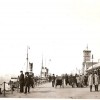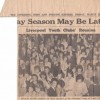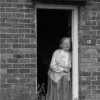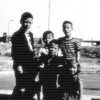NEWTON'S INSPIRATION by ROBERT EDWARDS
and my children had known Annelise. It was not hard to see how a child might squeeze its way into the innards of the shell and become entangled amongst the nails and rotted floorboards. Strictly speaking it would be trespass, of course, but there was no telling how this would be reviewed in a policeman's report of some hypothetical mishap. Uniforms bring a particular attitude to every situation, and the motivation to act decisively, perhaps intrusively even, whether or not it is strictly warranted by the circumstances. Uniforms indicate that action is needed, for the visibility of that uniform immediately put its wearer in the position of accountability. "You mean that you failed to act, constable." The suggestion judgemental and to the point, before the jury. The dereliction exposed, and the humiliation growing with each revelation of incompetence. Don't ever be accused of standing by doing nothing when decisive action was in order. I understood this, I thought, but why did so many people who wore uniforms seem to nurture this presage of accountability into the pre-emptive strikes of aggression? Foolish me, of course it was that the thrill of expectation of the exercise of power over others which drew the impotent to the uniform in the first place. A mere week of relaxation at the cottage had already dulled the sharp edge of my faculties. We carried the folding chairs though the overgrown bushes into a clearing near the old home and turned around to overlook Belleisle Bay and the headland as it dropped to the water where the Belleisle joined the Saint John river. The old maps referred to this as Frenchman's Bluff. Possibly it was a lookout for French soldiers of the armies sent out to protect La Nouvelle France from the invasion of the old foe from across La Manche. What do the French call the Channel Isles, I wondered? I must look it up some day in an atlas. Today there were no sentries on guard, unless they were much farther over to the north-west where the booming sounds of artillery fire from Camp Gagetown could periodically be heard, disturbing the summer peace of the lower Saint John river valley. I wondered whether the air traffic controllers had fixed the problem of flights straying off course over the artillery practice grounds on their way from Saint John to Fredericton. Real live target practice, I thought. Nothing else is quite like it. Annelise unfolded her chair and placed it as carefully as possible on the bumpy ground, and I followed suit. As Annelise opened her book, I fiddled with my camera, and with the attachments of the micro-lense. There were many flowers on tree branches where I could set up my tripod and my remote shutter extension. I peered through the lense to see the petals in the flower in close view and I judged the approximate spacing of the lense from the back and hind quarters of a bee which I imagined scrambling all over the flower. I sat back and waited in the warm sunshine. How many apple trees had we passed in the short distance from the cottage? At least ten or twelve, I thought. At each one, the ground was littered with fallen apples, but many more were still left intact on the branches. Each year it was the same. We really should become more organised and collect tons of apples for apple puree or apple pie. Perhaps when I retire and we move down east. So many apples going to waste. My mind flitted back to an earlier age when apples had been so much farther out of reach, and their owners had been so much more protective of their prized, nutritious, vulnerable little globules of green. My friends and I surveyed the haul, several apples pulled from trouser pockets and from down the front of the jerseys which were tucked into our trousers, so that no apples would escape when we jumped down from the high sand-stone wall. The tell-tale footprints in the soft black earth were several inches deep, and there were several casualties amongst the pansies of various colours that decorated the semi-circular flower bed directly in front of the wall. This was the spot where we had climbed that same wall about a quarter of an hour before. If you looked carefully you could discern the fine gaps between the stones where the aging mortar, loosened by years of exposure to the smoke of the industrial city, where little fingers could grip deep enough to pull the body up, and the soft toed sneakers (which were always called "pumps" in my city) which could wriggle their way into the same gap. Stage by stage, little boyish bodies in short trousers pulled themselves upward, sometimes sliding down until the hold was regained, but always moving inexorably upward to the top of the wall. The view was always worth a few minutes, and this was the chance to regain the breath before the downward assault on the other side. The pause was also a chance to claim the bragging rights of being first up on the climb, and to pull some of the stragglers the last few feet to the top. From the height of around 15 feet or so, the view was panoramic over Stanley Park. Beyond the short stretch of grass which we had crossed from the gravel walking path to access the wall, there was a hedge which blocked the view at ground level of the large playing field which was dotted with children and dogs and organized groups of schoolboy cricketers during the day. Now it was twilight and the crowds had dissipated with the setting sun. Beyond the field the stone wall on the far side of Priory Road was visible through the steel railings of the park boundary, which we could not see, but which were there nevertheless. Facing in the other direction into the private garden was a large detached home, a mansion it seemed to us. Many rooms on several floors. Bright clean windows with lace curtains, and floors with carpets and staircases and banisters of old oak, polished so that you could see your reflection in it. Several of us had been inside, for the house belonged to one of the neighbourhood doctors who kept a clinic on the main floor below the living quarters, and which we accessed through the front gate on Anfield Road. The grass was lush and green, for the high walls on all sides diminished the direct exposure from the sun. Scattered around the garden the prizes that we coveted, the branches of the apple trees and even the occasional pear tree (especially prized, as much for the challenge of negotiating the hazards which intervened as for the succulent rewards that we spied from afar) competed for the rays of watery sun which gleamed habitually through the haze. This evening we had confined ourselves to the top of the wall, for we could negotiate the side wall which divided the gardens of the surgery and the vicarage of St. Simon and St. Judes next door. Unlike the dividing wall from the park, which was broad and flat, and along which we could speed away as if on the ground, the side walls were narrow and covered with broken glass held in by mortar to deter little boys such as we were. By taking off our jackets and swinging them out on to the tops of the branches, we could carefully pull the whole branch full of apples which we could plunder as other boys kept watch. And this evening's haul had been very good. Tonight there had been no policeman's whistle to send us scurrying for cover in the bushes, from where we would find our way home by stealth or cover of darkness after a suitable delay hidden from view. I wondered what had changed in forty five years. We left apples to be freely taken by passing strangers on our cottage land, or else to rot on the trees. Were apples so precious in post-WW2 England that people went to such lengths to protect them from the grasp of little boys who had scarcely had the chance to enjoy a regular treat of fresh fruit? Was this the result of my own transplantation to a new country? The affluence brought by the passage of time? The difference in social attitudes? The consequence of war-induced poverty? Perhaps there was an element of each of these. Such good fortune I have found in my adopted country. I hope that I may never fail to appreciate it.Enter your story Back to main stories page |

 Latest Pictures (view more) Latest Audio (view more) Concrete Oceans by John Reilly |
Useful resources
- Non Gamstop Casinos
- Casinos Not On Gamstop
- Siti Casino Online Non Aams
- Casino Non Aams
- Best Online Casinos
- Casino Sites Not On Gamstop
- Non Gamstop Casinos UK
- Non Gamstop Casino Sites UK
- UK Casino Not On Gamstop
- Online Casino
- Non Gamstop Casinos
- Non Gamstop Casinos UK
- Non Gamstop Casinos
- Casino Not On Gamstop
- Sites Not On Gamstop
- Casino En Ligne
- Sites Not On Gamstop
- Best Slot Sites
- Slots Not On Gamstop
- Best Non Gamstop Casino
- Non Gamstop Casino Sites UK
- Casinos Not On Gamstop
- Casino Sites UK Not On Gamstop
- Casino Non Aams Sicuri
- Casino Online Italia
- Meilleur Casino En Ligne Belgique
- Scommesse App
- Sweet Bonanza Fruits Avis
- 코인카지노 도메인
- 파워볼사이트 추천
- играть в Plinko
- Casino En Ligne 2026
- Meilleur Casino En Ligne 2026
- Casino Senza KYC
- Siti Non Aams Bonus Senza Deposito
- Meilleur Casino En Ligne 2026
- Meilleurs Casino En Ligne
- Siti Casino Non Aams
- Siti Casino Online Non Aams




